
THE VOICE OF INTERNATIONAL LITHUANIA
|
VilNews has its own Google archive! Type a word in the above search box to find any article.
You can also follow us on Facebook. We have two different pages. Click to open and join.
|
Featured
Look to Norway!
- Posted by - (9) Comment
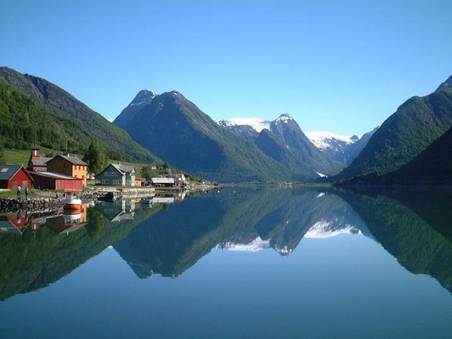
Text: Aage Myhre, Editor-in-Chief
When I came to Lithuania for the first time from my native Norway, more than 20 years ago, this country's political leadership was in the process of drafting the new law book that would be the legal framework for the modern democracy this country was supposed to become after all the years of Soviet occupation. Our small delegation from Norway suggested that one simply could translate our Norwegian legislation, of a free and functioning democracy, but Lithuania's politicians chose not to follow our advice, and used instead many years to develop their own laws. This country's leaders have, for better or worse, an extensive belief in their excellence and ability to reinvent the wheel even when it would have been so much easier to seek advice and help from good neighbours.
Many Norwegian delegations have appeared over the 20 years that have elapsed since that time. They have come and gone without seeing the relationship between Norway and Lithuania thus has become particularly warm or close. In several instances, I know that the Norwegians have travelled back home, headshaking. One example is the delegation that already four years ago came here to give advice on how Lithuania could solve its energy situation after the closure of the Ignalina nuclear power plant. The energy nation Norway was not listened to, and we all know what is now the situation in this country.
But it's not too late to seek cooperation with Norway, in many areas, and I encourage President Dalia Grybauskaite and Prime Minister Kubilius to follow up the visits and meetings that have taken place this last year. Norway is one of the world's richest countries, and also a neighbouring country that in many fields can both understand and help to find solutions to the many challenges still facing Lithuania. I sincerely hope that Lithuania now seizes the opportunity to develop a systematic structure for a very close cooperation with my home country.
The time of emergency measures connected to the crisis and depression areover. Now we need pragmatic, bilateral action.
A good and close cooperation must naturally involve benefits to both parties, and I can imagine many areas where that may be possible. Let me mention a few:
ENERGY
Norway is an energy nation of world format; in oil, hydropower, wind power, solar energy and energy efficiency. Lithuania is in the process of developing their own systems, but could move infinitely faster forward by collaborating with Norwegian companies and institutions.
INDUSTRY
I see it as likely that many Norwegian companies could outsource much of their production to Lithuania. What we need is a skilled professional, who knows Lithuania’s opportunities in manufacturing, who can travel around Norway to discuss possible cooperation projects with Lithuanian companies.
SHIPPING / OFFSHORE
A Norwegian friend of mine produces fittings for ships and oil platforms here in Lithuania. His company has also teams of Lithuanian workers who travel around the world to furnish ships or platforms. An area that could have been expanded to a considerable extent and scope.
AGRICULTURE
In the interwar years Denmark and Lithuania competed to be leaders in northern European agriculture. Today, agriculture in countries like Denmark and Norway at a very high level, whereas Lithuania desperately needs new investment and new technology. A collaboration with Norwegian farmers and agricultural organizations could come to mean endlessly much in this process.
FISHERIES
A Norwegian friend of mine is the director of a fish factory in Klaipeda. The owner is the Bornholm company Espersen. The factory was built new in Klaipeda's Free Economic Zone a few years ago. Now an extension of the factory is underway. This is an excellent example of how Lithuanian labour can do a good job for a company that processes fish for European markets.
TOURISM, COURSES AND CONFERENCES
I am convinced that Lithuania would attract many more Norwegian tourists if they had a person or a group of professional sales people that toured throughout Norway with presentations of what Lithuania has to offer. Not least, this applies to the training and conference sector, which is incredibly large in Norway. Lithuania should clearly be able to come up with very attractive and competitive offers.
Another example: The former Reval Hotels (now operated by Radisson BLU) in Lithuania are Norwegian-owned, and a close collaboration with the owner, the Linstow group, should be investigated further.
SCHOOLS
The Lithuanian school system desperately needs improvement, and collaboration, school-to-school, with Norway, would undoubtedly be useful. I got an excellent example of how useful such cooperation can be when a few years ago I visited the headmaster at the Birštonas Secondary School, Alvydas Urbanavičius. This school, having 800 students, is famous throughout Lithuania for its high level of education. When I asked the headmaster about the reason for this his reply was cards and cash, "We were very lucky to be 'adopted' by a Danish school already in the early 1990s, and the Danes taught us how to run a modern school and also gave us important funding so that we could avoid many of the problems that other Lithuanian schools and the very educational system here is still fighting with."
In terms of higher education, Norway is otherwise heavily involved in Lithuania already. The ISM Universities (University of Management and Economics) in Kaunas and Vilnius, for example, are owned by Norwegian BI (Norwegian School of Management).
But there is much that can be further developed in many levels and learning areas.
HEALTH CARE
A very large number of Lithuanian physicians and other health professionals are today working in Norway. Maybe there could be an idea if one instead tried to find forms of cooperation between Norwegian and Lithuanian health care so that this country would not be completely drained for health professionals for the benefit of rich Norway? Norway has a very important task to fulfil in this aspect, and it should be imposed on Norwegian health policy makers to take this issue far more seriously.
CULTURE, SOCIETY
Lithuania has a wonderful culture that should be experienced by a large number of Norwegians. An extensive cooperation between the cultural sectors of our two countries would mean microns for both parties. As an architect, there is much on my heart to find help to preserve the great Lithuanian wooden houses and other old architecture, and I hope the right institutions in Norway would be ready to help…
During my visit to Lithuania in January 1991, while the Soviet troops surrounded the Parliament and the TV tower in Vilnius, our Norwegian delegation brought with us a letter from Oslo's mayor confirming that Oslo was ready to be Vilnius' first sister city in the west. Later, many Lithuanian and Norwegian cities, municipalities and counties have established friendship agreements. But in most cases only with words, little action.
Now is the time for action. President Grybauskaite’s state visit a few weeks ago is a good step forward, and I hope PM Kubilius and his government now realise that Norway is a land of opportunity – also as Lithuania's closest friend and ally. A comprehensive and professionally planned cooperation structure on many levels should be prepared.
We have no time to lose.
- Bookmark :
- Digg
- del.icio.us
- Stumbleupon
- Redit it
Flower power!
- Posted by - (7) Comment
What most people in the West do not know, is that the Lithuanians and other peoples in Eastern Europe are living a double life
Many foreigners think that the majority of townspeople in Lithuania live in dreary grey Soviet blockhouses. They are right, but only to a certain extent. What most people in the West do not know, is that the Lithuanians and other peoples in Eastern Europe are living a double life. For while blockhouse apartments in the urban peripheries are the city dwellers habitat through the winter months, the gardens houses take over as the families’ main homes once the snow is gone. These gardens are in Lithuanian language called a ‘sodas’ and the very garden house a ‘sodo namas’.
Most garden houses are built on land plots just outside the cities. Most were built during the Soviet era, when many city dwellers were given free land by the authorities. This principle is well known in the west, as the so-called allotment gardening principle, but while it has a limited scope in the west, it is in this country and other East European countries very popular and widespread.
Allotment gardens are characterised by a concentration in one place of a few or up to several hundred land parcels that are assigned to individuals or families. In allotment gardens, the parcels are cultivated individually, contrary to other community garden types where the entire area is tended collectively by a group of people. The individual size of a parcel ranges between 500 and 1000 square meters. The individual gardeners are normally organised in an allotment association.
In the 1960s, several new suburbs started developing in Vilnius, and it is today
estimated that more than 70% of the city’s population lives in blockhouses.
Above: View from Antakalnis towards the (by then) new district Žirmūnai.
Photo: Antanas Sutkus, 1964
The 1980s saw the peak of the ‘sodas’ boom with virtually every affluent family in the country having a ‘sodas’ of their own or spending weekends and holidays at friends' ‘sodai’. Often ill-equipped and without indoor plumbing, garden houses were nevertheless the ultimate solution for many working class families to having an inexpensive summer retreat. Having a piece of land also offered an opportunity for city dwellers to indulge themselves in growing their own fruits and vegetables.
The collapse of the Soviet Union saw the return to private land ownership. Most gardens have since been privatized and Lithuania is now one of the world nations with the largest number of owners of second homes. The growth of living standards in recent years allowed many ‘sodas’ owners to spend their discretionary income on improvements. Thus, many recently built ‘sodo namia’ are fully equipped houses suitable for use as permanent residences. The market-oriented economy transformed the ‘sodas’ into an asset, which generally reflects the prosperity of its owner and can be freely traded in the real estate market.
It was in the 1960s that the allotment gardens outside the major cities of Lithuania really took off. My in-laws garden ('sodas' in Lithuanian) is a very good example. Their 'sodas' has over the past 30 years evolved into an incredibly lush, green oasis where family and friends very much enjoy the summer months.
My in-laws were among those who were allocated a land plot outside of Vilnius. Here, they have over the last 30 years developed a truly wonderful oasis of fruit trees, vegetable fields, berry bushes and a fine garden house that has gradually become more and more a house you really can live in the year around.
This is a garden where it really grows during the
summer months - in greenhouses and in the fertile soil.
It is when I come out to my in-laws garden that I really understand that Lithuanians at the bottom of their hearts are genuine farmers who know how to cultivate the rich Lithuanian soil into marvellous harvests.
It is out here I think I'm starting to understand more of the folk soul of this country.
|
|
|
Saslykai - cubes of meat, marinated and prepared over a fire indoor or outdoor
– is always the most popular ‘sodas’ meal.
There are those who say that Lithuanians are cold and unapproachable people. But those who say that have never been on a visit to a 'sodas'. For here is rife not only for flowers, but also people. When you come out here you will experience unique friendliness, neighbourliness, and much good humour. You will smell the food cooking in the fireplace fires or out on the many ‘saslykai’ barbecues. You will hear laughter, and in the evening you will see family after family unite around the dinner tables to enjoy the food that was just prepared on the flames, along with newly picked, fresh vegetables, berries and fruits.

What could be better than enjoying a tasty garden meal with good friends?
My children love their grandparents' garden. Here they can run happily barefoot in God's free nature. Here they can play with their many good friends from last summer. Seen through children's eyes who cannot wait to have the season’s first dive into the river, the Neris River not far away, offers a quiet pool which is very well suited to swimming when the ice has gone and the temperature outside has become blazingly high.
It is not always easy to explain why Lithuania is such an incredibly special place on this Earth. But words are not really necessary if you first get out to a 'sodas' area outside one of the nation's cities. Do not miss the opportunity. Summer is here. Right now…
Aage Myhre
Editor-in-Chief

My kids simply love playing in their grandparents’ garden oasis.
- Bookmark :
- Digg
- del.icio.us
- Stumbleupon
- Redit it
- Posted by - (0) Comment
The Lithuanian partisan war 1944 – 1953:
A mistake to confuse resistance to occupation and WWII

The Second World War in Europe was a war fought against fascism – in particular the German variant exemplified by Nazism – and including also Italian fascism. The Second World War in Europe ended with the surrender of Germany; a surrender to which Russia was the major contributor because Germany was largely defeated at Stalingrad and Kursk and was always in retreat afterwards.
The Resistance in Lithuania against Soviet occupation was a heroic effort by some Lithuanians to obtain freedom for their country. In my opinion it is a mistake to confuse resistance to occupation and the Second World War. After the end of the Second World War there have been many occupations of many countries by Capitalist and Communist powers and each side has tried to characterise any resistance to its forces as an act of the 'Other' side.
Resistance to Occupation has a very long and courageous history in Europe and throughout the world and no 'side' has a right to claim the heroic activities of resistance fighters/activists to support its ideology. Inevitably that requires misrepresentation of the motives and objectives of the resistance; part of the theme of the book "The Ugly American" about the then developing Vietnamese war. It is also the type of misrepresentation that leads to one 'side' claiming "We are all Georgians now".
This misrepresentation is a major cause of the inability of 'Western' countries to think in any clear way about the activities grouped under the label of 'terrorism' and it is better to avoid such ideologically driven commentary/analysis.
Robert Jennings,
Ireland-Lithuania
The ‘war against fascism’ was a construct intended to make the Soviet Union look good
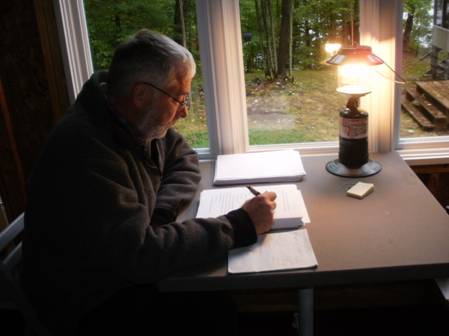
Antantas Sileika
Dear Editor,
Mr. Robert Jennings's letter, in which he claims that the Second World War was a war against fascism and nothing else, obfuscates the truth rather than clarifies it.
No one declared war on fascism. If they had, Spain and Portugal would have between attacked. The United Sates and other powers declared war against the axis powers. The "war against fascism" was a construct intended to make the Soviet Union look good and to disguise its own crimes. How was the Soviet invasion of Finland in 1939 a war against fascism? What about the forced incorporation of the Baltic States into the Soviet Union well before any war with Germany? What about the Molotov-Ribbentrop pact, which divided Eastern Europe between the Soviet Union and Germany? Would the Poles agree that the war was a war against fascism? Was the murder of the Polish officers at Katyn part of the war against fascism?
Neither Tony Judt nor Norman Davies, prominent historians of Europe, would agree that the conflict which only ended in 1989 with the fall of the Berlin wall was a "war against fascism."
Who benefits by such a formulation? Only the Soviets, whose crimes become excusable excesses of war. The independent Lithuanian government now considers the last anti-Soviet partisan commander, Jonas Zemaitis, to have been the Lithuanian head of state. It seems that L Beria considered him the same way because upon his capture in 1953, Zemaitis was transported to Moscow and interviewed by Beria who seemed to be seeking accommodation now that Stalin had died. However, both Zemaitis and Beria were executed that same year.
WW2 is remembered as a "good war", but this is a formulation that works only on the western side, where the allies came to help brave resisters such as the French underground. There were brave underground resisters in the East too, but no one ever came to help them. They fought until the dies, were captured, or gave up. Their story is just coming out now.
Antanas Sileika,
Canada
- Bookmark :
- Digg
- del.icio.us
- Stumbleupon
- Redit it
- Posted by - (6) Comment
Would a ‘Genealogy Section’ in VilNews be of interest for you?
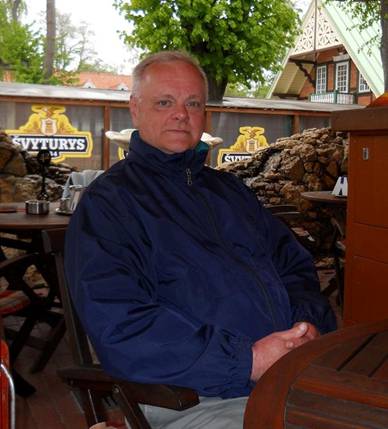
Please contact our Associate Editor, Vin Karnila, as soon as
possible if you think a ‘Genealogy Section’ in VilNews would
be of interest for our readers around the world.
vin.karnila@VilNews.com
Text: Vin Karnila, Associate Editor
We at VilNews have received numerous inquiries from our readers regarding locating relatives in Lithuania or more specific information about their Lithuanian ancestors. Since we know that tracing your Lithuanian Roots is a very important issue for many of you, we are considering a special section, “Genealogy Lithuania”, to assist you in finding information about your ancestors in Lithuania.
Please respond to us if you think such a section would be of interest for our readers around the globe.
The On Line Lithuanian Telephone Book
Once you have an idea as to what the names of your immigrant ancestors were the best place to start and probably the most recommended is the On Line Lithuanian Telephone Book
http://www.zebra.lt/lt/suzinok/telefonai/. This can help you find people currently living in Lithuania with the family name you are searching for. This was in fact how I first found members of the Karnila family so this is what I always first recommend for people to use.
It is however in the Lithuanian language so here are some instructions for using it.
Pavardė = family name/last name
Vietovė = location – In the pull down menu you will see “Didieji miestai”. These are the large cities in Lithuania. “Kiti miestai” are other cities in the country. If you want to search a specific city, click the city of your choice. If you want to search all of Lithuania, do not select a city.
Then click “Ieškoti” and the next page will show any matches to the name you entered.
Some helpful advice for finding a place on a map
The online Lithuanian Telephone Book web site will show you the location on a map however if you want to find the location again on a mapping web site you will need to enter the name correctly. If you try to copy the address that the phone book gave you it will not work. This is because the place names are displayed with Lithuanian grammar.
As an example, the listing could show an address like this:
Sodų g. 2, Rumšiškių mstl., Rumšiškių sen., Kėdainių raj.
The street address, Sodų g. 2 will work on a mapping web site but the rest will not.
“Rumšiškių mstl.” is actually Rumšiškės so you would need to enter Rumšiškės in the mapping web site. The “mstl.” is the abreviation for miestelis which means town. Don‘t enter the word “miestelis” or “mstl” in the mapping web site. You may also find a listing such as “Bajoriškių k”. The “k” means Kaimas or village so this would be the village of Bajoriškiai. A listing such as “Švenčionėlių m.”. The “m” means miestas or city so this would be the city of Švenčionėliai. Don‘t enter the words “village” or “city and don’t enter or “k” or “m” in the mapping web site.
“Rumšiškių sen.” is Rumšiškių seniūnija. Seniūnija is the local government administration office so this means that Rumšiškės is under the jusidiction of this office. You wont need Rumšiškių sen. For the mapping web site. Only enter this if you do not know the name of the village but know what administrative office serves it.
“Kėdainių raj.” is Kadainiai region. Again, you won’t need this for the mapping web site. About the only time you would need to enter the seniūnija or region is if there are more than one town or village with that name.
www.maps.lt is a very good mapping web site you may want to check out.
Even with the number of mapping web sites out there it is a good idea to get a map. The problem with the mapping web sites is that as you zoom in, the area you are viewing gets smaller and you lose the relationship of where you are in relation to other areas. When you zoom out you lose details. When you get a map you will want the scale to be at least 1:400 000. Even at this scale it will not show some of the smaller villages. As an example my family’s village of Garonys is not shown on a map of this scale. To get a map that shows my village I bought what is called an “apylinkės” (district) map which is at a scale of 1:130 000. Another good tool is the Lithuanian Road Atlas in 1:120 000 scale. All of these maps and atlases are available at www.balticvalue.com They have about the largest assortment of Lithuanian maps and road atlases on the Internet.
Some websites
We have compiled a list of some good web sites to get information from. Please keep in mind that no one web site will usually give you all the information you are looking for so it is good to check as many as you can.
Lithuanian Global Genealogical Society. LGGS
http://www.lithuaniangenealogy.org/
GenoPro - Genealogy ressources in Lithuania
Good site with useful links for searching for people of the Jewish Faith.
Included are The JewishGen Yizkor Book, JewishGen ShtetlSeeker, Litvak SIG and JewishGen Lithuania Database
http://www.genopro.com/genealogy-links/?country=LT&t=Lithuania
Lithuanian State Historical Archives
http://www.archyvai.lt/archyvai/index.jsp
Vilnius church provincial archives documents and metadata information system – Lithuanian language
http://www.kf.vu.lt/baris/
Archives of Belarus
http://archives.gov.by/eng/
Polish Virtual Archives
http://szukajwarchiwach.pl/
Polish genealogy and coats of arms
http://www.jurzak.pl/
Polish genealogy
http://www.genealogiapolska.pl/index.php
Lithuanian estates Database. Very interesting web site – Lithuanian language
http://www.heritage.lt/dvarai/ppavadinimas.php
Lithuanian military volunteers - Lithuanian language
http://www.versme.lt/sav_a.htm
The Statue of Liberty- Ellis Island Foundation
http://www.ellisisland.org/
LitvakSIG – Lithuanian Jewish Special Interest Group
http://www.jewishgen.org/litvak/all.htm
Genealogy Links Lithuania
http://www.genealogylinks.net/europe/lithuania/
LITHUANIA MAILING LISTS
http://www.rootsweb.ancestry.com/~jfuller/gen_mail_country-lit.html#LITHUANIA
Lithuania Professional Research
http://genealogyjourney.com/t/?x=Vilnius
Lithuanian Place Name Changes
http://www.rootsweb.ancestry.com/~ilwinneb/placelit.htm
As stated before, no one web site will usually give you all the information you are looking for so dear readers if you know of any web sites that are helpful in providing information for tracing some ones Lithuanian Roots please tell us about them so that we can share them with our fellow readers.
A word about some of the genealogy pay sites. As you search the web for sites that offer genealogical information you will come across many sites that require you to pay a fee to use them. Are they worth it??? Good question. Let’s face it, if they help you find your family they are worth it but the chances of finding your family on one of these sites is kind of hit or miss. This is because of how most of them work. Most of them do two things. They provide a program to organize your data or in other words create your family tree. What they also do is give you access to the data from the other people that use this site. So if some one that has a connection to your family has also paid to use this site then it is possible to view their information – maybe. The person has to authorize the web site to display their information. They can also instruct the web site to limit the information for privacy purposes. I have found that this “limited” information is not much help. Of course if no one with a connection to your family has used the specific pay site then it won’t be of much help to you.
As you start to gather information it is highly advisable to organize it. The best way to do this is to use genealogy software. There are quite a few genealogy software programs out there. I have tried a few and have not been very satisfied with them. The reason being that the reports they generate are limited. There is only one software program that I can personally recommend and I can tell you that I highly recommend this software. It is easy to use, easy to input data and easy to find data and it provides a very wide variety of report formats. The program is called “Brother’s Keeper” and it is considered one of the best genealogy software programs available.
You can get more information from their web site
http://bkwin.org/
at the bottom of the page you will find the link to their online store
http://brotherskeeperstore.stores.yahoo.net/brotkeepforw.html
Contact the people that you possibly are related to
Now let us talk about what you can do once you finally find information about a person or some people that you are possibly related to. There is only one thing to do – You need to contact them. If you have both an Email address and a mailing address I would recommend that you send both an Email and a letter. This is because you don’t know if one or the other is still current.
In the message KEEP IT SHORT AND SIMPLE. Tell them who you are. Tell them the information you know. This would be the information about the people in your family that do not live in Lithuania. If you have information about your family in Lithuania of course include this. What you are trying to provide is a line from you back to Lithuania. The information that is helpful is names, dates and places. Adding brothers, sisters and cousins will not be of much help and could confuse things unless any of these people were born in Lithuania or can trace themselves back to Lithuania.
If you are going to write a letter to Lithuania and don’t speak Lithuanian I really wouldn’t worry about it. In this day and age in Lithuania finding some one to translate a letter written in English is not much of a problem. However when I recommend KEEP IT SHORT AND SIMPLE, you will want to be very careful in regards to grammar and phrases. I am an English language trainer here in Vilnius and I can tell you that only my advanced level students can fully understand (sometimes) all the nuances of English grammar. When you write your letter try to use only the “simple tense” and limit the use of the “continuous tense”. Try to write nothing in the “perfect tense” as the perfect tense is VERY difficult to understand because this form of grammar does not exist in the Lithuanian language. Writing a letter all in the simple tense is easy to do and easy to translate and understand. I also operate an editing service here and I can tell you that most of the letters I edit related to genealogy end up being reduced by about 50% so that only the key information remains - KEEP IT SHORT AND SIMPLE.
The next question is when should I send the letter???
The answer is – As soon as you get a name and address to send a letter to!!!
I have edited some letters more than a year ago for some people and they still have not sent the letter. The usual reason is that they are still trying to get more information. Until you send the letter you probably won’t get any useful information so just send the letter. Some one may respond to your letter in effect saying that your information is too general to show a direct link. If that’s the case, at least you have established a contact. I have found that the people here in Lithuania are more than happy to try to help people find their families even if they are not sure they are directly related to you.
Searching for your roots can be interesting, rewarding and frustrating. So much of it is hit or miss and in some cases just pure luck and good fortune. Although it took years for me to finally find and connect with my family here in Lithuania, I was lucky that the name of Karnila is a rather unique name. All of the Karnilas in Lithuania are traced back to the same family. My grandmother’s family of Petkevičius is a different matter in that it is more common. Eventually I learned that I had to address her family as Petkevičius of the Kaišiadorys region. When I enter the name of Petkevičius in the On Line Lithuanian Telephone Book there are 280 matches. A dear friend of mine has the family name of Kazlauskas. When you enter this name in the On Line Lithuanian Telephone Book you get about 150 matches. Things like this can make matters much more of a challenge. In spite of some of these road blocks and detours the key to success is to just keep on searching.
|
Please let us know if you think a “Genealogy Section” in VilNews would be of interest |
- Bookmark :
- Digg
- del.icio.us
- Stumbleupon
- Redit it
I found my family!
- Posted by - (1) Comment

My first meeting with my family in Lithuania
- we had been searching for 90 years
By KR Slade
It's Saturday, 28 May 2005, 6pm, in Lithuania. I've just returned to my room in the capital city, Vilnius, from my nine-hour day-trip to Kaunas, Lithuania's second-largest city. Kaunas had been the capital of the first Republic of Lithuania, during the inter-world-wars period, and is 90+ percent ethnic-Lithuanian -- compared to 60 percent in Vilnius. Lithuania is, now and since 1990, in its ‘third’ republic, again free, after its second -- and fake --‘Lithuanian Soviet Socialist Republic’, when it was occupied and annexed by the Union of Soviet Socialist Republics. Kaunas is called ‘the heart of Lithuania’, especially by the people of Kaunas. Today is a very special day for my family in Lithuania: the fifth anniversary of the death of our family’s Cardinal Vincentas Sladkevicius.
I exited the mini-bus (CDN$5) on ‘Savonariu (i.e., 'Volunteers' -- named for those who fought against the invading Nazis, or Soviets, or Poles) Prospect’ in downtown Kaunas, after the 1.25 hour trip, which is 1.5 hours by any other kind of vehicle. The mini-bus does not leave Vilnius on any ‘Western’ schedule, other than 'when it is full' with its maximum of eight passengers, or sooner if everyone waiting too-long complains. The driver will stop anywhere a passenger wants. There is a debate as to whether this bus service is legal. I was passenger number eight, so we left in one minute.
My Lithuanian language must be getting better, because upon arriving in down-town Kaunas, the bus driver understood where I ultimately wanted to go, and he told me to take a trolley-bus when he dropped me off. I asked a man at a trolley-stop how to get to the cathedral; but it was his 11-year-old son who became very proud (in front of his father and two younger brothers), because it was only he who could help me in English. Since 1990 independence, English replaced Russian that is taught in schools from first grade.
I got off the trolley-bus (CDN$.45) after I saw Laisves (i.e., ‘Freedom’) Street. I remembered being lost on that wide pedestrian-only street on both of my two previous, cold and rainy day-trips in the last year, to Kaunas.
I arrived early enough to while-away an hour on this summer-like day, with a salad and Coca-Cola (total: CDN$5) at a sidewalk café on the pedestrian-only, cobblestone streets of the nearly-empty Old City. The vegetable salad with milky dressing was good; I’m getting used to the standard room-temperature cola. A group of a dozen foreign tourists arrived, quickly gave up trying to understand the Lithuanian-only menu, began yelling into the basement dinning room for a waitress, ordered beers, and seemed surprised when the 20-year-old waitress completely understood their own second-language English.
I arrived fifteen minutes early at the Basilian-style cathedral; it’s only 400 years old, but it appears 1,000 years older because of its style of architecture, reminiscent of the time of St. Basil The Great, a Father and Doctor of the Church, most revered here in Eastern Europe. I entered and watched a child’s baptism ceremony at the front alter while I walked the length of a side aisle to the private chapel-room. Here, in this Gothic-style quiet area of his cathedral, Cardinal Sladkevicius is buried in the floor.
In a few minutes, about three-dozen relatives, and spouses, some with their small children, had gathered. I had never met any of them.
However, I had extensive research information from my previous seventeen months in Lithuania. Fr. Peternal of Vilnius had helped me for the previous eight months. We obtained the help of Fr. Klimas at the church in the village (i.e., Zasliai -- Guronys) where my family had lived for the last 300 years. Irena, Director of the Cardinal Sladkevicius Museum in Kaunas and author of two biographies of the Cardinal, provided documents. Antanas Paulauskas, author of the unpublished family-genealogy manuscript, wrote a letter to family members to introduce me. A couple of English-speaking cousins, one in London and another in Kaunas, had e-mailed me. Cousin Lina and her husband Marius had telephoned me and introduced me to the no-cost Skype computer telephony so that we could have several more long-distance conversations; and most importantly to tell me that the family’s private commemoration was on Saturday, not on Sunday (that was the public commemoration). Otherwise, I would have arrived a day late, and never met the family. However, I was slightly uncomfortable because some of the family knew me, but I did not know any of them.
In the chapel of this cathedral, after some time for reflection by our family, the very pleasant and jovial Prelate Vincentas Jalinskas entered, summoned us to him to stand around the Cardinal’s tomb, and he sang a cappella some hymns, interspersed with his personal recollections of the Cardinal, whom he knew well, and then greeted every one of us individually. The Prelate walked to the opened door, shook the hand of each of us, and told each of us, in Lithuanian, “Be careful of this step-down, here” as we re-entered the main part of the cathedral where a wedding was now taking place. If not only from the mid-day sunlight streaming blazingly through the ancient windows, perhaps more from exiting our transcendental experience, his caution was to be appreciated, as he well-knew that we all now were walking-on-air.
We all gathered in front of the cathedral for a few minutes, and then about thirty family members drove a short distance to a tiny chapel in a nearby neighbourhood for Mass, with two priests and two folk musicians. Father Alfonsas Bulota was the personal secretary to the Cardinal, and Fr. Virginijus Lenktaitis also knew His Eminence well. After the mass, we walked through the garden behind the chapel to a sit-down lunch gathering at the priest's house, where individuals shared their reminiscences about their uncle/cousin/friend, whom everyone calls 'His Eminence'. I did not understand what anyone was saying, but I could easily understand the fondness of their memories and their profound respect and admiration for our cardinal. The earlier sombre faces of the men and the tears of the women, at the cathedral and the mass, now turned to smiles and laughter.
Janina (the daughter of a brother of the Cardinal), who cared for His Eminence during his last three years’ battle with two cancers, and who took care of me throughout this day (although she doesn't speak any English!) arranged a ride for me back to Vilnius, with two non-English-speaking relatives. Five minutes into the drive, we discovered that Dr. N’s wife, Milda, and I could communicate in French.
Of course, we had to stop for ‘cepelini’, ten minutes out of Kaunas. Cepelini is a favourite Lithuanian ethnic food made from grated potatoes packed around a meatball, usually made of pork, served warm, with a light cheesy sauce. It has a nickname, ‘Zeppelin’ because it is the plate-size oblong shape of a dirigible aircraft. This restaurant is well-known for good ethnic food, and I enjoyed it in the leisurely atmosphere of the garden terrace and watching the children in the playground.
Between our translations of Lithuanian and French, I thought of how I had enjoyed myself so very much this day and how I hoped to have other family gatherings this coming summer. I am fortunate to be related to such nice people; there are twice as many more family members to meet here in Lithuania; there are more in London, the Americas, etc. In addition, there will be my Lithuanian grandmother’s family yet to discover.
One day meeting some of my family, a first meeting since my grandparents left Lithuania ninety years ago; total cost: CDN$10.45; total satisfaction: yes.
A few weeks later, I would find myself in a small village, 20 km from Kaunas, spending the weekend at Janina’s farm. The 24th of June is St. John’s Day, the biggest holiday in Lithuania, and Janina’s name-day, as well as her birthday. St. John’s Day has been celebrated in Lithuania for a thousand years before Christianity arrived here in the fourteenth century; pagans knew that it’s the shortest night of the year.
I became more acquainted with her son, daughter and husband and their 4 year-old, as well as Fr. Bulota, other family, and some family friends. Remembering names and relationships is going to be a temporary challenge. I remember the name of one of the three dogs, but not the cat; maybe there are no names for the five goats, twenty turkeys, four ducks, two roosters, and whatever number of chickens. The bull in the next pasture does not appear to be especially friendly. I rode a bicycle for the first time in 30 years, but only for 3,000 meters to the village store for ice-cream. I enjoyed the farm’s swimming hole. The food brought back forgotten memories of my grandmother’s cooking; the names of many foods here do not have English translations.

The Cardinal's garden-table, now on a farm
The first of our gatherings was out-of-doors, in the yard, around a weathered table, the Lithuanian variety of a picnic-table, of an ethnic design but not otherwise special. The first night was rainy, we ate inside, and afterwards I was shown some family photos of His Eminence. One photo showed the Cardinal in his garden, in his later years: sitting at the same table. Suddenly that table became to me, as it is to everyone who knows, very special. In addition, the photos are kept in the bookcase wall unit, not so special a piece of furniture, except that from the photos it is evident that this bookcase also was his. Now that soviet-era contemporary-design bookcase acquires a very historic provenance. I learned more about his forced and long ‘internal exile’ under the Soviet Regime, when he had been appointed by Pope John XXIII to be a bishop. There were the facts of his life-long suffering from a childhood disease, caused by poor diet from poverty. And, there were the many stories, from his almost eighty years, of interpretations of what he liked and what he did not especially like, and some of these interpretations are for only us ever to know.
I expect to be returning soon to the village to take advantage of my open invitation there. There are many more family, living and past, to get to know. There are more villages to visit. This story does not seem to be going to have an end any time soon...
- Bookmark :
- Digg
- del.icio.us
- Stumbleupon
- Redit it
- Posted by - (0) Comment
Lithuania and the Soviet Union
1939 – 1940 (1 – 4)
Dear readers,
On 15 June 1940, Soviet Russia invaded Lithuania. This was the beginning of Lithuania's loss of freedom for more than fifty years and the beginning of one of the saddest and most tragic parts of Lithuania's history. There has been much talk and speculation about how this invasion came about and what Lithuania did, or as some would accuse didn't do, to prevent it. To shed clear light on this topic, we would like to share with you parts of the personal memoirs of Juozas Urbšys who was a member of the group that personally met with Vyacheslav Molotov and Stalin. After reading these fascinating and very informative memoirs we are sure you will have a better appreciation for the precarious situation the leaders of the then free Republic of Lithuania were in and what they did to try to protect the lives of the Lithuanian people.
|
|
|
|
|
We share these memoirs in 4 parts. Here they are:
(click on the titles to open the articles)
Part 1: In Moscow
Part 2: Vilnius, army garrisons
Part 3: We accustom ourselves to army bases.
Part 4: Ultimatum. Occupation.
- Bookmark :
- Digg
- del.icio.us
- Stumbleupon
- Redit it
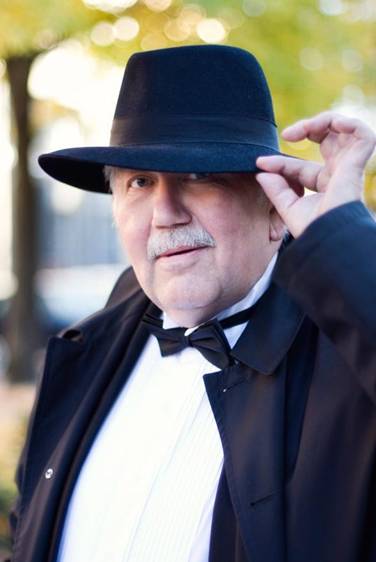
Lithuania’s great Maestro, Professor Donatas Katkus
Photo: Elena Petkauskiene
Donatas Katkus interviewed by Aage Myhre
Here he is, Lithuania’s famous music professor, Maestro Donatas Katkus! The man behind the Christopher Summer Festival since its very beginning in 1995, the man who has spread the joy of music throughout the streets of Vilnius for a whole life, making this city one of the most attractive in the world for all music lovers!
The Christopher Summer Festival is all about music – mostly classical, but also jazz and other genres are featured. The festival takes place in Vilnius churches, courtyards and concert halls, and lasts throughout all the summer, from the 1st of June till the 28th of August, even if the ‘official’ part lasts ‘only’ from 1st of July till the 26th of August! This summer’s festival is the 17th – a fantastic achievement by the founder, leader and artistic director – the utterly famous professor Donatas Katkus – and his excellent team!
The professor is conducting music and music festivals more energetically than anybody else, and he also treats the very term music in an anything but traditional manner, for example when he conducts an acrobatic plane, doing its loops according to Bach’s “Ave Maria”, or when he conducts a complete “orchestra” of bulldozers and excavators.
- Bulldozer conduction is very sexual, says the professor, gesticulating and emphasizing the importance of his words, in his so typical manner - full of humor, intensity and warm enthusiasm.
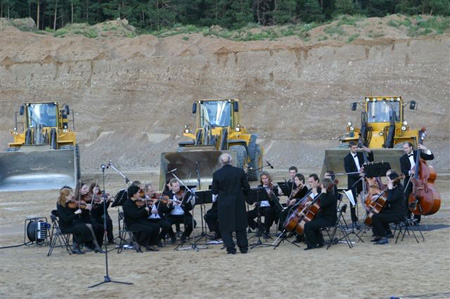
- Bulldozer conduction is very sexual, says the professor
Donatas Katkus was born in Kaunas 68 years ago, where his mother, an amateur actress, raised him alone. The professor was the outcome of a hectic love affair, and he never met his father.
-But, says the professor, I do not complain, because I am a very young and very nice man, and I am just happy my mother did not take the veil in a Belgian nunnery, as she planned to do before the war started.
|
|
Life is easy
Professor Katkus is widely known for his excellent mood. The laughter and the good story is never far away, always told with great immersion and sometimes also with aloud gesticulation in order to make himself fully understood, like when he told me about the concert where he conducted a small plane to make its loops to the music of “Ave Maria”.
Everybody in the restaurant we are sitting in stops talking when the professor starts his demonstration of how this event had been performed, using his arms to follow the loops, and his voice to indicate how the plane engine had been increasing its number of revolutions on its way up to highest octaves, into a decrescendo of sound and movement when the plane turned its nose down again.
- I am an actor by nature, and I do not take life too seriously, says the professor.
Forest brothers
But life was not always easy for Donatas Katkus. He can still well remember the summer day in his mother’s native village in the year 1949, when KGB suddenly appeared with a young, white-shirted man they had arrested. After one hour the troops re-appeared, and then the young forest brother’s shirt was totally soaked with blood. They would put the dead body of forest brothers at show for two weeks in the center of the village square in order to observe the reactions of the people watching the gruesome show so they could find out the relatives of the diseased and demonstrate how dangerous it was to fight for the freedom of our country, says the professor with a sad glance.
|
|
Family in Siberia
- Many from the family of my wife were deported to Vorkuta and the Siberian tundra, and I know stories of how they had to build their houses from frozen human bodies because no other building materials were available.
- But I know that they had their music, and I tend to think that the Lithuanian folk songs very much contributed to their survival, he tells, and the eyes of the professor start shining again.
Fear is terrible
- How was it to work during the Soviet period?
- Well, for people like me, working with culture, it was not too bad. But it was terrible always to feel fear, always having to look back over the shoulder in case somebody should be listening. Vilnius was a true province during those years, as everything international was supposed to take place in Moscow, and only at the end of the period it was possible to get impulses through Warsaw and later also directly from the West. My personal “breakthrough” came when I, as a young man, was chosen to participate in a competition in the Belgian city of Liege, where our Vilnius String Quartette won the first price.
One of the greatest achievements of Professor Katkus was to start and develop the Vilnius String Quartet, where he played his main instrument, the viola. – I have been playing in the quartet for 36 years, and it is still doing well today, so I am rather proud of that, he says.
St. Christopher
The St. Christopher has come to play the main role in the life of Professor Katkus, first when in 1994 he founded the St. Christopher Chamber Orchestra, and in 1995 when he started the now so famous St. Christopher Summer Festival, which every year is very successfully concluded, with its 30-40 concerts in different Vilnius venues during the months of July and August.
The saint’s name derives from a 3rd century legend, and the name means “Christ-bearer”. St. Christopher is the patron Saint of Vilnius and is featured on the coat of arms of the city. Due to the old legend, St. Christopher has become the saint of people who carry certain loads on their shoulders. The name seems to fit for the professor…
Money is crazy
Professor Katkus admits that it has been a very hard job to collect all the money needed for his summer festivals. – For example, he says, I remember one year it was only one week till the opening and I was still lacking 70,000 litas.
- But you did not get a heart attach?
- Look, I get several heart attacks in every festival, but do the festivals become inferior because of this? It’s so crazy always to have to think about money, which in fact is SOOO small a part of reality, so I prefer to remain happy whatever happens!
|
It’s so crazy always to have to think about money, which in fact is SOOO small a part of reality, so I prefer to remain happy whatever happens!
|
Advice to foreigners
- What is your advice to foreigners living in or visiting Vilnius?
- My advice is to take advantage of the fantastic musical life we have here in this rather small city, including two symphony orchestras, two chamber orchestras, two string quartets and a Music Academy with concerts almost every day! Both our Opera and our National Philharmonic are of fantastic level, and there are also a number of good pop and jazz concerts around in town. The cultural life in Vilnius is in fact so attractive and extensive that there is no need to go anywhere else. You are never alone in Vilnius!
Especially when the St. Christopher Summer Festival is in full swing virtually all through the summer...
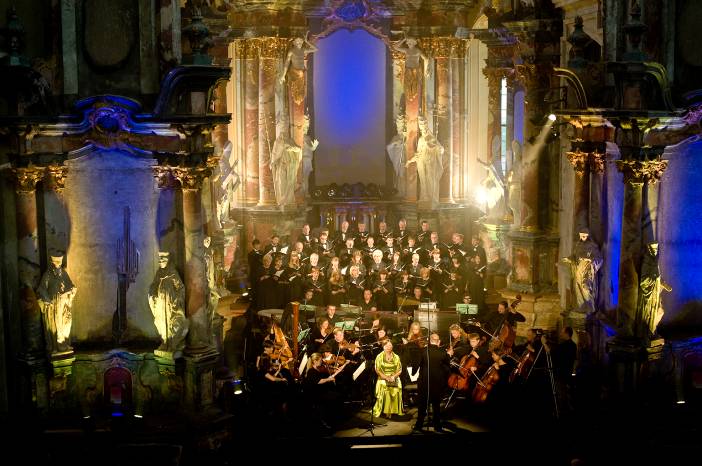 Professor Donatas Katkus conducting a church concert during last year’s Christopher Summer Festival.
Professor Donatas Katkus conducting a church concert during last year’s Christopher Summer Festival.
- Bookmark :
- Digg
- del.icio.us
- Stumbleupon
- Redit it
Tolerance education in Lithuanian schools
- Posted by - (1) Comment

By Arturas Bakanauskas
This became important a few years ago after the deaths of a number of girls, many in Poland, after teasing, or worse. The problem had not existed under the Soviet regime, or had been considerably smaller. But then the environment had also been considerably different: cartoons taught moral values, the authorities were charged with creating a single state (and so did not tolerate nationalism or anything that might be seen as promoting fragmentation), in the absence of money, friendship was the coin of the day, etc.
But after the deaths of these girls, measures started to be taken to avoid such deaths in Lithuania. One of these is a springtime voluntary intolerance-education week, which seems to focus on the thought that being called names does not feel very good. But this stimulus has apparently also been a curse, since I have seen a reaction only to those actions which caused the deaths, and not to intolerance as a whole.
The events below did occur and I do have witnesses to them. But the names have been eliminated as far as possible because removing a few people from the system is not likely to change anything as whole as the problem is bigger than just a few people or just one school. Naming names would just ruin the lives of the people involved, not fix the problem.
A certain amount of teasing always occurs at school and so long as it stays within certain limits, is perhaps even helpful as it teaches children how to handle stress. The job of the teaching staff is to see that it does not exceed those limits and start eroding the self-confidence of the victims or create the impression that such behaviour should be considered the norm.
The pupil in this case was a girl, who started coming home with stories of being harassed by the girls and the boys. The girls would go into the WC and comment on those using the toilet because there were no stall doors to provide privacy. When a girl is menstruating, this is particularly embarrassing and so the girl stopped using the toilet at school all together. Of course, there was another reason, namely that like most schools in Lithuania, there are no seats on the toilet bowls. You are expected to squat over the toilet in some fashion in order to use it. Not using the facilities for hours at a time has resulted in some health issues, like her drinking too little water in general.
The harassment from the boys was not just verbal, but also physical. For example, the girls were not allowed by the boys to participate in certain games during physical education because they could not throw the ball well enough. Physical violence and the threat of it were used to enforce the rule. The teacher did nothing to correct the situation.
Another time, the girl came home complaining that the boys were taking everything off her desk and tossing it around the room, breaking some of it. When she complained to the homeroom teacher (since this had occurred between classes and the classroom teacher had not taken responsibility), at first the pupil was told that the homeroom teacher would take care of it, then that the pupil should take better care of her stuff. Curious as to the reason for the change, the parents started asking the daughter what her role in all of this had been. At that point, it became clear that the boys had first tossed other pupil’s possessions to her and she had tossed them back to the perpetrators, not to the victims. In other words, she had been part of the problem until hoist on her own petard. Nevertheless, the reaction of the homeroom teacher in refusing to correct the situation at all just because one of the perpetrators had become a victim was wrong.
Finally one boy started using sexual terminology with the girl and only with her. When she complained to the homeroom teacher, the answer was that boys will be boys. The parents complained over the phone to the homeroom teacher with no results. After speaking to the headmaster over the phone about the situation, the boy started using a nonsense word with a similar sound when the teachers were around, but the original word when they were not. For English speakers, such a logical step is normal since there are so many euphemisms in English. There are none that I know of in Lithuanian, even for Russian expletives. So it raises a question of where the boy got the idea to circumvent the correction by using a euphemism. A couple of weeks had passed by now and the parents were becoming rather concerned since there seemed to be no recourse within the school itself. So an official sounding letter was drafted that listed the whole history of all the harassment and sent to the homeroom teacher. She apparently realised the gravity of the situation, i.e. that this could escalate outside the school very quickly and finally took action. The harassment stopped for good.
In a separate incident, the pupils started calling one teacher gay due to his behaviour. Like the pupil above, no action was taken to remedy the situation. The teacher in question thought that responding was beneath him as he was married and had a child, proof to him that the claims were false. When the parents asked the ethics teacher (who is in charge of intolerance education) why there had been no response from the school, such as a special class to educate the pupils that gays are often (if not usually) not gay by choice and that there are many very productive members of that community in society, she stated that she was unaware that the situation had existed. Since the school psychologist would have been teaching such a class, the parents asked her. She replied that such a class could not and would not be taught in Lithuania where even some members of parliament were homophobic. The scandal that could possibly arise would be huge. Any such sex education could only be conducted in the home. After all, ‘to change society you have to start with the adults.’ Obviously many would argue the opposite, that change starts with the new generation, not the old.
The parents did an internet check of the nearby schools in hopes of transferring their daughter. According to the bloggers, the school in question is actually better in this regard than most of the other local schools and those that are better are difficult to transfer into.
As can be seen by the above examples, the school system still needs improvement. And there appears to be no protection for homosexuals or any programme to build their self-esteem. Most likely such changes will have to come from the Ministry of Education and Science in the form of guidelines for teaching tolerance and building self-esteem. In the top heavy system that exists in Lithuania, it is unlikely that change will come from the bottom up because a teacher or school who teaches tolerance of homosexuals would be exceeding its authority and thus could be subject to reprimand or dismissal.
- Bookmark :
- Digg
- del.icio.us
- Stumbleupon
- Redit it
Intolerance in today’s Lithuania
- Posted by - (0) Comment
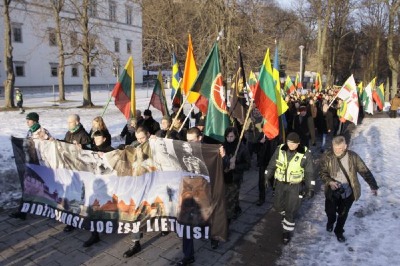
Neo-Nazis marching in Vilnius during
Lithuania’s Independence Day, 11 March 2011.
Photo: http://holocaustinthebaltics.com
Intolerance, racism, anti-Semitism, xenophobia and homophobia. These are words and terms we unfortunately have heard and seen far too often in Lithuanian media in recent years.
This country that for hundreds of years was a thriving cradle for co-existence between people from many nations, cultures and religions. Or, as the British historian Norman Davies puts it: “Lithuania was a haven of tolerance”. Davies was not the only one who took notice of this. Erasmus of Rotterdam (1466 – 1536) is quoted as stating; “I congratulate this nation [Lithuania] which now, in sciences, jurisprudence, morals, and religion, and in all that separates us from barbarism, is so flourishing that it can rival the first and most glorious of nations.”
But no longer so. Today’s Lithuania faces several forms and manifestations of intolerance. According to B.O. Dittrich (2007), Lithuania is the most homophobic of all the EU countries. In 2000 a survey conducted by European Value Study Group showed that the level of xenophobia in Lithuania is one of the highest in Europe. For example, as much as 23% of Lithuanians would not like to be neighbours with Jews (with Russians – 14, Estonians – 11.2%, Latvians – 5.2%, Germans – 5.2%, Swedes – 2.1%).
Attitude towards immigrants is as bad – 22.7% of Lithuanians would not like to be neighbours with immigrants, 94.2% believe that they should get a job before the immigrants, 55.2% do not think that our country should accept refugees, and as much as 58% of Lithuanians do not trust foreign companies.
During the spring of this year we have seen neo-Nazis marching through Vilnius on Lithuania’s Independence Day, we have seen the neo-Nazis hoisting swastika flags on the nation’s official flag poles, and we have seen lawmakers in the country’s Committee on Legal Affairs vote to make even more stringent censorship legislation for homosexuals, saying that they should be able to fine people for the "propagation of homosexual relations" in public.
This has earned condemnation from EU groups, but the European commission scarcely dares to take action when member states disregard with what West Europe consider fundamental rights for its people. For example, when the law that bans the “promotion of homosexuality”, little was heard from the EU.
Reactions from Lithuanian leaders against this worrisome trend has unfortunately also been relatively vague, although there are signs that some finally begin to wake up. But there are still some politicians who seem to breed homophobia and racism in this country.
VilNews will for some time focus on the problem of intolerance, and we do hereby open up for serious posts, interviews and articles on this theme. We begin today with an interview with Professor Irena Veisaite (below) and we urge you, dear readers, to write to us with your own thoughts and reflections.
Maybe one day we will again be able call Lithuania ‘A Haven of Tolerance’…
- Bookmark :
- Digg
- del.icio.us
- Stumbleupon
- Redit it
Imminent collapse of the Euro?
- Posted by - (0) Comment
![]()

http://www.thetrumpet.com/?q=8225.6887.0.0
Rates on Greek debt soared to an astounding 21 percent last week. The end game on the Greek debt crisis could be near. If Greece defaults on its debt, it could trigger a domino collapse across Europe. But do the strategizers behind the euro have a secret plan that could totally reform the union?
One thing for sure is that the Greek government cannot long afford to borrow money at such high rates. It is virtually locked out of the debt market. That means that sooner or later, somebody isn’t going to get paid. In this case it mostly means big banks in France, Germany, Austria and Belgium.
The consequences could easily go global. European Central Bank executive member Jurgen Stark warned on April 23 that Europe may be about to suffer a banking crisis worse than that of 2008. It “could overshadow the effects of the Lehman bankruptcy,” he warned.
Bigger than Lehman?
According to Stark, a default by Greece would be the worst option for the eurozone. This would trigger massive and immediate government spending cuts and the inevitable social unrest that would ensue.
More critically, it could easily cause lenders to balk at loaning money to other troubled states like Ireland and Portugal—causing interest rates to soar in those countries and causing them to default too. Even Spain and Italy could be pushed over the edge, which would throw the whole eurozone into question.
- Bookmark :
- Digg
- del.icio.us
- Stumbleupon
- Redit it
QUOTE: Prophet Muhammad (570-632)

Without that I knew about it had my 4-year-old daughter made this drawing,
almost a month after she and I had seen on CNN how the planes crashed
into the twin towers in New York on 11 September 2001.
11 SEPTEMBER 2001: I had just come home to our apartment here in Vilnius after having brought my then 4-year-old daughter home from kindergarten. She was playing on the floor beside me while I sat down to watch the latest world news on CNN. What I saw on the screen in front of me was so unreal that I first could not believe that this was real news. My first thought was that CNN was showing fragments of a new film or the like. But it soon dawned on me that what I was seeing was the beginning of an unimaginable attack and a tragedy that would forever change our world's history and development.
11 September 2001 was the day when America was attacked on its own soil. The unthinkable had happened.
Today, 2 May 2011, Osama bin Laden was killed in Pakistan by US special troops.
The almost ten years that have followed since that September day in 2001, have brought enormous changes, not only in the U.S., but to the entire world. The war against terrorism, the war in Afghanistan, the war in Iraq, the new Arab revolts, and countless suicide attacks across virtually the entire world have all become symbols of our time -- in a way few of us could have imagined when the new millennium had barely started.
Lithuania has been little influenced by the 'war on terror'. Admittedly, the country is participating with troops in Afghanistan and it also became an almost-scandal when it became known that the CIA had two prisons for suspected terrorists here since 2005.
But even if Lithuania is not so much directly affected by what has happened around the world after the attack on the twin towers in New York on 11 September 2001, this country is also a part of a global society that is both physically and mentally experiencing enormous repercussions.
I have often asked myself: "What kind of world is it our children have to grow up in post-9/11? The daily traumas inflicted to the children in the two countries that have been hardest hit, Iraq and Afghanistan, are naturally the worst and most long-term harmful, but our children in the so-called free world have undoubtedly also been influenced by what happened and they will for many years have to experience the consequences in many different ways.
I was not aware that my little daughter saw what took place on the TV screen this September day ten years ago, so I must admit I was slightly shocked and shaken when she suddenly, a month later, came to give me a drawing she had made. The image of 'a plane flying into the tall tower' had been instilled in the child brain, and here she came to me with her visualisation of what she had seen and experienced in her thoughts when I thought she was quietly playing, occupied in her own childish world.
It goes without saying that we, the adults, need to help children feel as safe as possible at a time when the world has become a more dangerous place. Parents and teachers in particular should help youngsters understand current events factually, how events do or do not impact their lives, and how to handle their emotional reactions. All children are likely to be affected in some way by ‘the age of terrorism’.
For many of our children, the guidance of caring adults will make the difference between being overwhelmed and developing life-long emotional and psychological coping skills. It is crucial to provide opportunity for children to discuss their concerns and to help them separate real from imagined fears.
The lessons of 11 September 2001 are many. Some ‘contribute’ by burning the Quran. Others work for reconciliation and understanding between the people of our fragile little planet.
Hopefully the lesson of 2 May 2011 will be a peaceful one.
Aage Myhre
Editor
- Bookmark :
- Digg
- del.icio.us
- Stumbleupon
- Redit it
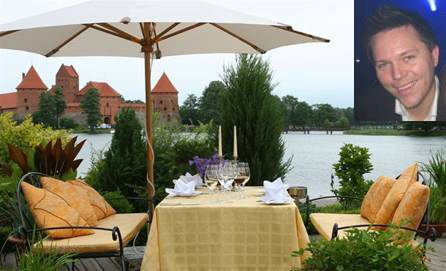
How can a fantastic place like Vilnius with its 500,000 plus inhabitants and Lithuania with its 3 million plus inhabitants have a smaller tourism budget than a mountain village in Norway of 450 people?
Text: Thomas Danielsen
I am sitting in Apvalaus Stalo Klubas (Round Table Club) in Trakai writing this article. It is a beautiful spring Sunday and the sun is shining from a clear blue sky. There are still some ice flakes left on the waters in front of the wonderful Trakai Castle. It is still too cold for sitting outside, but I have a fantastic window table overlooking the castle. There is a mix of tourists and locals inside the restaurant. On my right there is an old couple from Germany and to my left a young Lithuanian couple staring deep into each other’s eyes and holding hands.
As I am soaking in this wonderful and romantic atmosphere, I find myself filled with ambivalent feelings. I simply love this place and I have spent many hours looking at this castle. I am thinking how sad it is, that there are not more people who get to experience this unique ambience and this "one of a kind" view. My ambivalence goes towards the fact that the Lithuanian tourism sector - of which I have been a part of for 7 years - is suffering to such a great extent, while there are so many great experiences to be had here.
I think it is a paradox that a country with so many treasures within the "tourism sector" is haunted with such poor leadership. >From what I see (or do not see), the people in charge of Lithuanian tourism obviously have no idea what they are doing! They simply lack the understanding and knowledge of tourism as a product and as a concept! This, combined with no budget at all (yes, apparently, the tourism department has no budget for tourism marketing), goes to show the poor management and understanding of this important sector. After all, the tourism sector is in fact one of the biggest sectors IN THE WORLD, if not the biggest. This fact being neglected does not only sadden me, it scares the living daylights out of me!
The tourism marketing budget of Lithuania (not counting whatever money Lithuania receives from EU for such purposes) is 0 Euros, 0 Dollars and 0 Litas.
Now let me give you some food for thought:
For a period of 6 months from October 2009 to April 2010 I had a consulting job as destination director in a small mountain village in Norway called Hovden. Hovden is predominantly a winter destination and the tourism is mostly centred around one "small" mountaintop (1183m) with 5 large ski lifts and a lift capacity about 3000 people per hour. There are 3 hotels and 2 apartment hotels in addition a range of cottages, both for private use and rentals. This mountain community of 450 people has various challenges related to their situation, ranging from how to attract more tourists in the summer season, to socioeconomically challenges such as how to attract people to settle down here. During the winter season, this little mountain village explodes in the number of people living or coming here for shorter or longer stays (weekend breaks, seasonal workers etc). On the weekends between November and April the village grows into as many as 10 000 people. The local government realized decades ago that in order for them to simply survive as a community, they had to put their efforts into what they were given - a mountain suitable for skiing! This was in 1966-67. Now fast forward to present day - 2011. The realization that tourism is extremely important has turned this little spot "in the middle of nowhere" into a tourism paradise. And here is the punch line; this little spot called Hovden - hardly visible on a map - has an annual tourism budget of more than 1.1 million euro!
The question resounding in my head is this:
How can a fantastic place like Vilnius with its 500,000 plus inhabitants and Lithuania with its 3 million plus inhabitants have a smaller tourism budget than a mountain village in Norway of 450 people?
If any bright mind out there is now thinking "well, Norway is a very rich country and they can afford stuff like this", then I simply answer back that it is a known fact that in order to make money, you need to spend money! This is called marketing. And to further underline my point, I will give you a free 30-second lesson in business, economics and marketing:
If you spend money marketing Vilnius/Lithuania (mind you, based on a proper, professional strategy, branding and long term objectives!), you will get an increased inflow of tourists to the country. With increased flow of tourists, the bus companies transporting tourists will need more drivers to transport them from A to B. The hotels will need more staff in order to maintain a certain level of service. The restaurants and cafes will need more waiters to cater for the increase in clients. The guide companies will need more guides to show the tourist the city/country. The shops in Vilnius will need more staff to service the increase of customers. The spas will need more therapists to deal with the increase of clients. The airport will need more baggage handlers. All of these companies will eventually need more accountants and more administrators.
By now you should get my point!
But just to point out the obvious:
More tourists require more people to be hired in the tourism sector directly (travel agencies, bus companies, hotels), as well as in the various sectors benefitting from an increase of clients/tourists in general (like the retail sectors for example). With more people hired, unemployment will go down (a benefit for the society), tax payments from both private people and companies will go up (increased government revenue), restaurants will need more products from the farmers, bus companies will need more gas from the gas stations. The list goes on and on...
Despite the fact that this is an extremely simplified economic model, this is how the (macro) economy works. (Those geniuses who thought that increasing VAT on hotels from 5% to 21% would increase governmental revenues, need to buy a book called ABC of economics).
I am still sitting in the Round Table Club in Trakai. The old couple have left, but a bus full of Italian youths stopped by and took some photos, bought a take away pizza and some bottles of water and left. They were speaking very vividly about the castle, how beautiful it is and how amazing this place is. This is my point; Vilnius, Trakai and Lithuania excite people! They are willing to come to the country and SPEND MONEY, their hard earned cash, their disposable income (disposable income, Mr. tourism boss man, is the amount of income left to an individual after taxes have been paid, available for spending and saving"). This is really not rocket science! In order for people with disposable income to come and "dispose" of their cash in Lithuania, they need to know about Lithuania and Lithuania needs to be accessible (am I the only one who finds it strange that Lithuania does not have a national flag carrier?). Stop thinking that China is an important market for Lithuania tourism! It is NOT! How about focusing on the markets 1-2-3 hours away which coincidentally both share historic links with the region and has a culture for travel abroad and have high disposable income (No, not Russia, but Europe and Scandinavia)!
The paradox remains. A village in Norway of 450 people far outperforms Vilnius of 500,000 people and Lithuania of 3 million people by any measure!
As a final note I want to express that there is a distant light in the tunnel, a glimpse of hope with the new Mayor of Vilnius, Mr. Zuokas. Despite the different opinions about his previous periods as mayor, he seems to have some understanding of how "things work". And to his return to power, I wish to present him with a challenge. Mr. Zuokas, you have at your power the chance to create, what is in my opinion, the most interesting job in all Europe within the tourism sector. This is the position as Destination Director of Vilnius Tourism (Visit Vilnius, Vilnius Tourism Agency, Vilnius Convention Agency, Destination Vilnius or whatever you may choose to call it). The fact of the matter is that with the right team and a "slightly" higher budget than today, Vilnius and Lithuania could change a lot. But please, should you take this challenge, do not hire any of your friends or whoever is willing to work for the lowest wage or someone corrupt! Hire someone with the proper knowhow, intelligence, experience and motivation. And please, do give him/her a budget with clear goals, clear expectations and clear requirements. You are free to give me a call! The editor has my number!
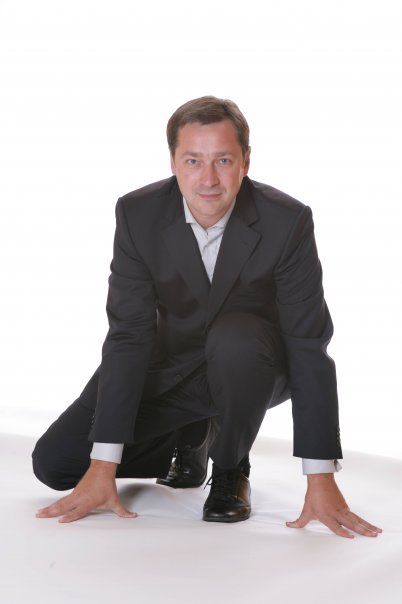
I want to express that there is a distant light in the tunnel, a glimpse of hope with the new Mayor of Vilnius, Arturas Zuokas. Despite the different opinions about his previous periods as mayor, he seems to have some understanding of how "things work".
- Bookmark :
- Digg
- del.icio.us
- Stumbleupon
- Redit it
- Posted by - (1) Comment

Breast cancer diagnosis saves lives

The International Women's Association of Vilnius and Roche Lietuva continue the battle against breast cancer
For the third year in a row a charity dinner has been organized to raise awareness and collect money.
All money collected from sponsors and from the dinner will be used to purchase biopsy needles which will then be donated to the main oncology hospitals in Klaipeda, Kaunas and Vilnius.
Breast cancer is one of the most common forms of cancer to affect women. While early diagnosis allows to dramatically increase survival rate, the percentage of breast cancer cases diagnosed at the late three and four stages is still high in Lithuania.
Last year's charity event 'Dancing through the Ages' raised more than 40,000 litas which was used to purchase the biopsy needles which are essential for early diagnosis.
For more information go to http://www.iwavilnius.com/blossom-of-hope.html
For sponsorship contact Barbara Little at barbsvilnius@gmail.com
- Bookmark :
- Digg
- del.icio.us
- Stumbleupon
- Redit it
My mother’s Napoleon
- Posted by - (1) Comment
 |
Napoleonas torte (Recipe translated by my mother Romute Petkaitis years ago) By Ellen Carmichael Illustration: Lithuanian Bakery, Nebraska, USA http://www.freshfromne.com/nebraska-food/lithuanian- bakery-napoleonas-torte-3-pounds The Lithuanian Bakery is an Omaha based producer of specialty breads and Lithuanian tortes. In over 40 years of operation the Lithuanian Bakery has successfully established itself in the specialty baked goods market. The specialty breads and tortes are produced daily by an experienced staff committed to high quality products and customer satisfaction. |
Waffle - 4 1/2 C. flour
little salt (they never measured)
Cut in 4 1/2 sticks unsalted butter. When butter is well cut with flour, in separate bowl mix:
3 eggs
4 1/2 Tbs water
then add to the flour mixture. Mix well. Put in refrigerator for 5-7 hours or overnight. Next day, divide dough into 8 to 10 pieces. Roll out each piece very thin to around 11 inches and bake in 375 to 400 degrees for 20 minutes on cookie sheet until light golden brown.
Cream - 3/4 C. flour
1/2 C. sugar
2 C. milk
Mix all together and cook on low-medium heat until it gets a little thick.
Mix........2 eggs and put in mixture of flour and milk. Mix well and set aside until well cooled.
Then whip..2 boxes sweet whipped butter
3/4 C. sugar
4 egg yolks
Once it is whipped together, put into the flour and milk mixture which should be almost room temperature. Mix well. Then add:
1 Tbs. brandy extract
1 Tbs. orange extract
1 Tbs. vanilla extract
1 Tbs. lemon extract
Rind from 1 lemon
lemon juice from 1 lemon
1-2 jiggers (1 1/2 oz each) of V.O. or any other good whiskey
Mix all ingredients together.
Spread thinly between layers leaving some for top and sides. With sharp knife, cut cake to shape it round, saving the crumbs. Spread remaining cream on the top and sides. Sprinkle the top with the saved crumbs. Decorate top with a few thin twisted orange slices.
Recipe can be increased to 1 and a half the ingredients to make a taller, more dramatic torte. Well worth the time and effort. Labai skanu!
- Bookmark :
- Digg
- del.icio.us
- Stumbleupon
- Redit it
The Greeks won, the Lithuanians lost!
- Posted by - (2) Comment
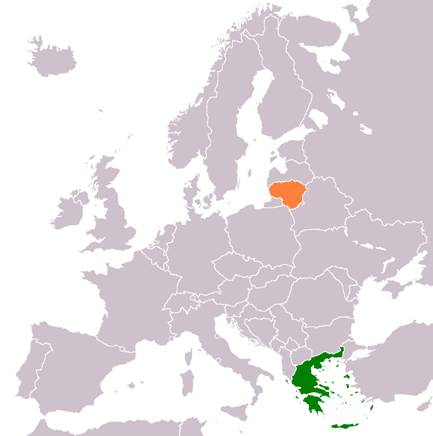
Before they realized what is going on and who was robbing them, the Lithuanian people got clubbered by PM Kubilius’ ambitious austerity policy and the younger ones started emigrating in catastrophic numbers, seeing no future in the country whose GDP was reduced (from a low post-Soviet level) by some 20% by the combination of the old nomenklatura rent-seeking policies and the global Great Recession. Lithuania is hollowing out, unfortunately.
Palemonas Legend: A Tale of Two EU Nations
Since the annus mirabilis 1989 the theory was that Central and Eastern Europe, CEE, would use its abundant and relatively educated labor force to grow faster and on a more sustainable and consumer-oriented (prosperity) basis due to shift to markets and euro-integration.
What got in the way is the theory of (rational?) expectations?
True, CEE did receive a sort of a very modest version of Marshall Plan from the EU. True to four EU freedoms, Western Europe is opening to labor movements (emigration) from CEE. So when new CEE policymakers were implementing liberal market reforms, they should have anticipated some outflows of labor force to higher bidders in Western Europe due to simple demonstration effect.
What got in the way is the law of unintended consequences in complex processes?
When the British opened their labor markets to the East, they anticipated some 10-12 thousand immigrants from Poland, for example, what they got is some one million and rising. Who knows what the figure will be when Germany opens this May?
The tale of two EU nations: What got in the way is the paradigm of hard-to-calculate policy externalities?
The current Kubilius Government of Lithuania adopted a very ambitious (no IMF help even sought!) and rather harsh austerity modeled on the reigning EU thinking in order to clean the Augean stable of Lithuania's finance wrecked fo by former Soviet nomenklatura hijacked governments that largely used EU money to place their cronies in plum jobs (to the exclusion of younger generation of course!), "prikhvatize" real estate and keep it from any taxation, etc. Consequently, Lithuania did not attract much Western direct investment so the productivity remained at low post-communist levels at the time when emerging Asia provides stiff global competition.
Before they realized what is going on and who was robbing them, the Lithuanian people got clubbered by this new ambitious austerity policy and the younger ones started emigrating in catastrophic numbers, seeing no future in the country whose GDP was reduced (from a low post-Soviet level) by some 20% by the combination of the old nomenklatura rent-seeking policies and the global Great Recession. Lithuania is hollowing out, unfortunately.
While the Lithuanians sobered rather in time, the Greeks have been continuing the party until the last bottle:)
Greeks won, Lithuanians lost! This is the tale of two integrating nations: they are even related since ancient times according to a Greek Palemonas legend.
Wishing you all the best, I remain
Yours Sincerely
Valdas Samonis, PhD, CPC
The Web Professor of Global Management(SM)
Institute for New Economic Thinking, New York City, USA
and Royal Roads University, Canada
Knowledge Management Editor, Transnational Corporations Review (TNCR)

Val Samonis, PhD, CPC, (val@samonis.com) has worked with top business, technology, and policy leaders in many countries, e.g. Nobel Laureates in Economics and Finance (Tobin, Arrow, Solow, Leontieff, Klein) as part of The Stanford Economic Transition Group; Polish Deputy Prime Minister L. Balcerowicz, Czech Deputy Prime Minister P. Mertlik; other top experts globally; lectured internationally on trade, investment, corporate governance/finance and enterprise restructuring, competitiveness, and ICT & knowledge management (KM) in the global economy; and has been extensively published.
He has been contributing research to The Joint (Business, Government, Academia) Committee on Corporate Governance (Canada); on FDI and knowledge economy clusters to Columbia University's VCC Center on Sustainable Investment; publishing at The Knowledge Board, the European Union's main KM think tank. Also, Val Samonis has been serving as a knowledge management expert in global business and advisor to a number of governments, international organizations, business, and academia on four continents; individually and via his virtual network organization SEMI Online (www.samonis.com) established since the mid-1980s.
Dr. Samonis managed and/or worked in international research and advisory ("blue ribbon") teams sponsored by The Business at the Bottom of the Pyramid Initiative (Cornell University and the University of Michigan); The African Capacity Building Foundation (G-7 countries and global institutions); The Virtual Consultation Forum for the First Inter-American Meeting of Ministers and High-Level Authorities on Sustainable Development; The Hudson Institute; World Bank; The OECD-World Bank Private Sector Advisory Group on Corporate Governance; USAID; CASE Warsaw; EU (ACE, TEMPUS); Soros Foundations; The Center for European Integration Studies (ZEI Bonn); ACCC/AUCC/CIDA (Canada); and a number of governments, e.g. in Baltic States, Poland, Canada. Dr. Samonis served as an advisor to the Czech Government, the Lithuanian Parliament, international organizations (e.g. UNCTAD, WTO, ITC), and multinational corporations (e.g. CARE, Medley Global Advisors, Andersen Consulting). Prof. Samonis has been teaching online, onsite, and his DualModeInstruction(SM) comprehensive and specialized courses, modules, seminars, training sessions, briefing sessions, occasional lectures, as well as doing research and supervising graduate (EMBA, MBA, MA, PhD, DBA) students at the University of Toronto (Canada), Royal Roads University (Canada), Lansbridge University (Canada, Asia), University of Maryland UC (USA), Center for University Studies (USA & Mexico), National American University, (USA and globally), Touro University International (USA and globally), Warsaw School of Economics (Poland), The International Trade Research Institute (Poland), University of Tasmania (Australia), The Center for European Integration Studies (Germany), Vilnius University and Kaunas University of Technology (Lithuania), The Baltic Management Institute (Baltic states), Kyiv University (Ukraine), and other institutions internationally. Last but not least, Dr. Samonis is one of the two founding editors of the globally acclaimed Journal of East-West Business (Routledge), and has been serving on review and advisory boards of many other international scholarly journals in business/finance/high tech.
- Bookmark :
- Digg
- del.icio.us
- Stumbleupon
- Redit it

Lithuanian American Council (LAC) Delegation in Conference at Lithuania’s Embassy (LE) in Washington, D.C. 1 April:
From left to right: Ambassador Žygimantas Pavilionis, Debra Miller (LAC), Rolandas Kačinskas (LE), Paulius Vertelka (LAC), Nida Gelažytė (LAC), Henri Gaidis (LAC), Emanuelis Zingeris (Lithuanias Parliament), Bernice Aviža (LAC), Saulius Kuprys (LAC), (LAC), Bronius Čikotas (LAC), and Simonas Šatūnas (LE)
Photo Inga Lukavičiūtė (LE)
Text: Stasys Bačkaitis
A delegation representing the Lithuanian American Council (LAC) was received at the Lithuanian Embassy in Washington D.C. on April 1, 2011, where it met with the Chairman of the Foreign Affairs Committee of the Lithuania's Parliament, Emanuelis Zingeris and Lithuania's Ambassador to the United States, Zygimantas Pavilionis. Also in attendance were members of the embassy staff including Deputy Amb. Simonas Satunas and Deputy Minister Rolandas Kacinskas. The LAC delegation was led by LAC president Saulius Kuprys and included Bernice Aviza, dr. Stasys Backaitis, Bronius Cikotas, Henry Gaidis, dr. Nida Gelazyte, Debra Miller, and Paulius Vertelka.
In the course of the meeting LAC representatives expressed their concern on a wide range of topics including Lithuania's developing energy policy, the country’s image in the international community, emigration issues and their demographic impact, the prospect of maintaining citizenship rights of recent immigrants, ongoing cooperation between organizations of the Diaspora and Lithuania, and minority issues in Lithuania. LAC representatives suggested that Lithuania would benefit significantly by availing itself of the expertise and knowledge found in the Diaspora communities in developing energy and security policies and a host of other areas such as environmental issues, ecology, medicine, economic development, and the promotion of improved interactions between the government and the people through non-governmental organizations. It was suggested that an interactive website between Lithuania and Lithuanian communities throughout the World would not only be a step in the right direction, but would also assist in improving the country's image in the international community and would provide a vital channel for dialogue seeking solutions to issues of common concern.
Mr. Zingeris thanked the Lithuanian American Council and its member organizations for their ongoing contribution in fostering bilateral U.S.-Lithuanian relations and in constructive cooperation especially in promoting Lithuania's admission to the Atlantic alliance. Mr. Zingeris noted that Lithuania needs continuing support from the West as new issues develop. Minority issues are being addressed, and it is anticipated that they will be resolved in the near future. A primary concern in the realm of energy security is the proposed construction of two nuclear power plants at Lithuania's eastern and southwestern borders at the behest of the Russian interests. This is not a question of merely local interest but one which has far-reaching international ramifications as it affects the safety and stability of the entire region and the future of emerging democracies. Members of the delegation noted that American Lithuanian organizations are in the process of raising these concerns to the attention of their elected representatives since the issues also touch upon vital U.S. interests and potentially impacts the entire Western alliance.
Mr. Zingeris observed that the proposed interactive website which would enable dialogue between Lithuania and the communities in the Diaspora was an intriguing proposal. Its potential benefit warrants further discussion and study. He will pursue the subject matter upon return to Lithuania. Ambassador Pavilionis conveyed on behalf of the government of Lithuania its gratitude to Lithuanian Americans and their organizations for their invaluable contribution in reestablishing Lithuania's independence and acknowledged their continued active support since then. Lithuanian American organizations play a significant role on the international stage as proponents of democracy and the rule of law. The active participation of Lithuanian Americans is key in facilitating continued dialogue between the US and Lithuanian administrations, especially in the area of security and energy policy. Ambassador Pavilionis noted in closing that such face-to-face meetings are mutually beneficial and ought to be convened on a regular basis.
The LIthuanian American Council established in 1915 today encompasses 18 national organizations.
- Bookmark :
- Digg
- del.icio.us
- Stumbleupon
- Redit it
VilNews e-magazine is published in Vilnius, Lithuania. Editor-in-Chief: Mr. Aage Myhre. Inquires to the editors: editor@VilNews.com.
Code of Ethics: See Section 2 – about VilNews. VilNews is not responsible for content on external links/web pages.
HOW TO ADVERTISE IN VILNEWS.
All content is copyrighted © 2011. UAB ‘VilNews’.

 Click on the buttons to open and read each of VilNews' 18 sub-sections
Click on the buttons to open and read each of VilNews' 18 sub-sections 











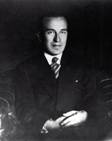
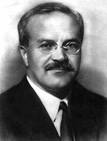











.jpg)



